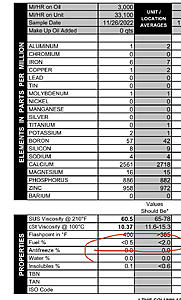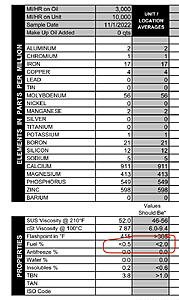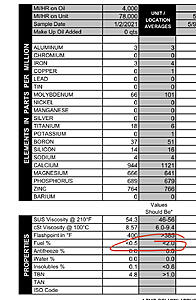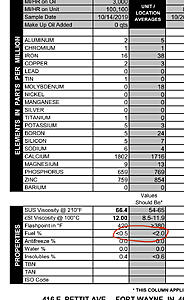Acura Oil Consumption (Burn)
#41
Suzuka Master
GDI engines cause more fuel dilution than port injected engines, even new. Jason explains some of the reasons, pretty clearly. Problems of GDI engines
It does seem that Honda/Acura has more problem with this than some other manufacturers.
It does seem that Honda/Acura has more problem with this than some other manufacturers.
Honda definitely has more problem than others. The numbers are not that bad for DI Toyota, perhaps due to the hybrid injector design that combines port injection and direct injection.
I switched to 5w-30, which will end up with 0w-20 viscosity anyway, so no harm is done.
#42
Racer
What do you mean? Engine shouldn't put any gas into oil when its new. If it does, it means seals are not good, which means cylinders are not rounded. How is it can be even possible without manufactures defects?
Gas in the oil leads to thinning the oil and damaging the engine. It must be addressed by Acura.
Gas in the oil leads to thinning the oil and damaging the engine. It must be addressed by Acura.
#43
Originally Posted by Baldeagle
When an engine is cold, the block and piston rings have not expanded to proper size and the gaps are larger. DI injectors have a very non-homogenous spray pattern to begin with. Port injection atomizes fuel much better. But when the engine is cold, DI’s spray pattern becomes downright terrible. As a result of this horrible fuel delivery, the ECU must grossly over inject fuel just for the engine to run. Most of that fuel does NOT combust. It blows by the rings into the oil and dilutes it. If the driver applies ANY boost when the engine is still cold, it greatly multiplies the oil dilution.
Ours MB, Nissan, Jeep, cars build in range 2014 - 2022, Mileage on engines 10K - over 100K
Non of them shows oil dilution.
I read a long time ago it was an issue with CR-V engines.




#44
Suzuka Master
[QUOTE=DanD.;16868594]I do run oil tests for all our cars, we don't have Acura but our daughter soon need a car and I was considering one.
Ours MB, Nissan, Jeep, cars build in range 2014 - 2022, Mileage on engines 10K - over 100K
Non of them shows oil dilution.
I read a long time ago it was an issue with CR-V engines.
Attachment 96641Attachment 96644Attachment 96643Attachment 96642[/QUOTE
Blackstone labs does not accurately measure fuel dilution. They usually under-estimate it. If you want more accurate measurement of fuel dilution, you need to use Polaris lab (kits can be purchased through Amsoil website).
With blackstone, You need to look at the viscosity of the oil you used @100C and see how much it decreased. With RDX, my viscosity was 8.8 (Mobil1 EP 0w-20), but in 3K miles it got reduced to 6.5. Thats a big drop, and also fuel dilution using Polaris lab is 4-5%. Not just my report, search this website, others got the same results. You will also find more reports on BITOG
Ours MB, Nissan, Jeep, cars build in range 2014 - 2022, Mileage on engines 10K - over 100K
Non of them shows oil dilution.
I read a long time ago it was an issue with CR-V engines.
Attachment 96641Attachment 96644Attachment 96643Attachment 96642[/QUOTE
Blackstone labs does not accurately measure fuel dilution. They usually under-estimate it. If you want more accurate measurement of fuel dilution, you need to use Polaris lab (kits can be purchased through Amsoil website).
With blackstone, You need to look at the viscosity of the oil you used @100C and see how much it decreased. With RDX, my viscosity was 8.8 (Mobil1 EP 0w-20), but in 3K miles it got reduced to 6.5. Thats a big drop, and also fuel dilution using Polaris lab is 4-5%. Not just my report, search this website, others got the same results. You will also find more reports on BITOG
#45
[QUOTE=russianDude;16868598]
Thank you so much for good information, I will try Polaris in next tests, interesting enough, Blackstone pointed to the low viscosity @100C for 5W-40 oil, which is 10.3 after 3K miles, only for MB GLC which has 2.0L turbo charged engine.
Looks like Jeep and Nissan with V6 no turbo both using 0W-20 oil has the best viscosity @100C.
I do run oil tests for all our cars, we don't have Acura but our daughter soon need a car and I was considering one.
Ours MB, Nissan, Jeep, cars build in range 2014 - 2022, Mileage on engines 10K - over 100K
Non of them shows oil dilution.
I read a long time ago it was an issue with CR-V engines.
Attachment 96641Attachment 96644Attachment 96643Attachment 96642[/QUOTE
Blackstone labs does not accurately measure fuel dilution. They usually under-estimate it. If you want more accurate measurement of fuel dilution, you need to use Polaris lab (kits can be purchased through Amsoil website).
With blackstone, You need to look at the viscosity of the oil you used @100C and see how much it decreased. With RDX, my viscosity was 8.8 (Mobil1 EP 0w-20), but in 3K miles it got reduced to 6.5. Thats a big drop, and also fuel dilution using Polaris lab is 4-5%. Not just my report, search this website, others got the same results. You will also find more reports on BITOG
Ours MB, Nissan, Jeep, cars build in range 2014 - 2022, Mileage on engines 10K - over 100K
Non of them shows oil dilution.
I read a long time ago it was an issue with CR-V engines.
Attachment 96641Attachment 96644Attachment 96643Attachment 96642[/QUOTE
Blackstone labs does not accurately measure fuel dilution. They usually under-estimate it. If you want more accurate measurement of fuel dilution, you need to use Polaris lab (kits can be purchased through Amsoil website).
With blackstone, You need to look at the viscosity of the oil you used @100C and see how much it decreased. With RDX, my viscosity was 8.8 (Mobil1 EP 0w-20), but in 3K miles it got reduced to 6.5. Thats a big drop, and also fuel dilution using Polaris lab is 4-5%. Not just my report, search this website, others got the same results. You will also find more reports on BITOG
Looks like Jeep and Nissan with V6 no turbo both using 0W-20 oil has the best viscosity @100C.
#46
Suzuka Master
[QUOTE=DanD.;16868610]
Thank you so much for good information, I will try Polaris in next tests, interesting enough, Blackstone pointed to the low viscosity @100C for 5W-40 oil, which is 10.3 after 3K miles, only for MB GLC which has 2.0L turbo charged engine.
Looks like Jeep and Nissan with V6 no turbo both using 0W-20 oil has the best viscosity @100C.
Most of the time viscosity drop is due to fuel present in oil.
Thank you so much for good information, I will try Polaris in next tests, interesting enough, Blackstone pointed to the low viscosity @100C for 5W-40 oil, which is 10.3 after 3K miles, only for MB GLC which has 2.0L turbo charged engine.
Looks like Jeep and Nissan with V6 no turbo both using 0W-20 oil has the best viscosity @100C.
#47
Racer
I do run oil tests for all our cars, we don't have Acura but our daughter soon need a car and I was considering one.
Ours MB, Nissan, Jeep, cars build in range 2014 - 2022, Mileage on engines 10K - over 100K
Non of them shows oil dilution.
I read a long time ago it was an issue with CR-V engines.
Attachment 96641Attachment 96644Attachment 96643Attachment 96642
Ours MB, Nissan, Jeep, cars build in range 2014 - 2022, Mileage on engines 10K - over 100K
Non of them shows oil dilution.
I read a long time ago it was an issue with CR-V engines.
Attachment 96641Attachment 96644Attachment 96643Attachment 96642
I ask these questions because I change my RDX’s oil at 7,000 miles and it burns no oil and has zero gas odor. But my car is also garaged, which never sees a temperature below 45°F, even in winter. Plus, the first several miles out of my neighborhood are flat and 30 mph, which implies no boost during the over-injection period. Rarely does my RDX have a trip less than a 1/2 hour. There are many variables in this oil dilution equation. To conclude any DI-turbo has bad rings solely because of oil dilution may not be merited. An outside car with very cold starts in winter and that can’t be babied when cold can experience oil dilution without a ring problem. Modern technology isn't without its problems.
#48
Originally Posted by Baldeagle
It is great you perform oil analyses on all your cars. Are any of those engines DI? Or worse, DI and turbocharged? I also see relatively short 3,000 mile and 4,000 miles OCIs. Also, are any of these cars garaged?
I ask these questions because I change my RDX’s oil at 7,000 miles and it burns no oil and has zero gas odor. But my car is also garaged, which never sees a temperature below 45°F, even in winter. Plus, the first several miles out of my neighborhood are flat and 30 mph, which implies no boost during the over-injection period. Rarely does my RDX have a trip less than a 1/2 hour. There are many variables in this oil dilution equation. To conclude any DI-turbo has bad rings solely because of oil dilution may not be merited. An outside car with very cold starts in winter and that can’t be babied when cold can experience oil dilution without a ring problem. Modern technology isn't without its problems.
I ask these questions because I change my RDX’s oil at 7,000 miles and it burns no oil and has zero gas odor. But my car is also garaged, which never sees a temperature below 45°F, even in winter. Plus, the first several miles out of my neighborhood are flat and 30 mph, which implies no boost during the over-injection period. Rarely does my RDX have a trip less than a 1/2 hour. There are many variables in this oil dilution equation. To conclude any DI-turbo has bad rings solely because of oil dilution may not be merited. An outside car with very cold starts in winter and that can’t be babied when cold can experience oil dilution without a ring problem. Modern technology isn't without its problems.
We are living at PNW, so we don't have a very cold winters and cars are all garaged.
Only Nissan and Jeep with Castrol Platinum shows good oil test results after 4K and could run till 5 or so but MBs especially diesel needs very frequent changes to keep it clean and protected as after 3K viscosity drops so bad on gas model and a lot of metals in diesel after 4K
Last edited by DanD.; 01-29-2023 at 10:40 AM.
Thread
Thread Starter
Forum
Replies
Last Post
Otherbmw
4G TL (2009-2014)
7
02-05-2016 07:24 PM
TSX Flip-Side
1G TSX (2004-2008)
5
09-30-2003 06:36 AM



